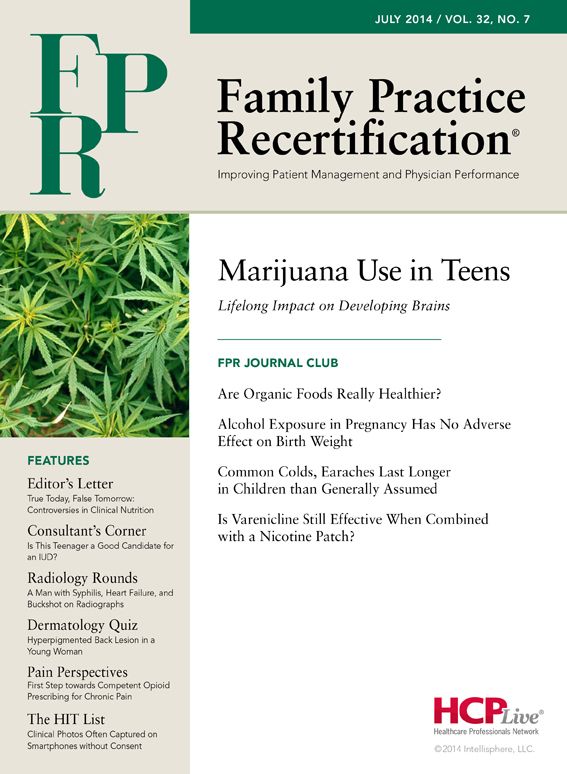Publication
Article
Family Practice Recertification
True Today, False Tomorrow: Controversies in Clinical Nutrition
Author(s):
Disproven medical theories and practices can be slow to change, and nowhere is this truer than in the field of clinical nutrition.

Marin Quan, MD
Editor-in-Chief
On my first day of medical school, a professor announced matter-of-factly that “half of what we will teach you over the next 4 years is true, and half will be false; the real problem is that we don’t know which is which.” Although I found his remark facetious at the time, decades later, I cannot stop marveling at how prophetic his disclosure has proven to be.
It is humbling to consider the number of times widely accepted medical concepts have been falsified over the years, including the routine administration of prophylactic lidocaine following myocardial infarction (MI), the contraindication of beta-blockers in heart failure (HF), the use of menopausal hormone therapy, the favoring of infant formula over breast milk, the indication of vagotomy and antrectomy for recurrent peptic ulcer disease, and the rationale for radical mastectomy in breast cancer patients, just to name a few. However, disproven medical theories and practices can be slow to change, and nowhere is this truer than in the field of clinical nutrition.
One suitable example is the ongoing saga of the “incredible, edible egg.” A large egg contains approximately 200 mg of cholesterol, which comprises two-thirds of the current recommended daily cholesterol limit. Due to its high cholesterol content, the egg has been vilified for years as a risk factor for coronary heart disease (CHD) and stroke, so the public has been advised to limit egg intake.
However, studies now show that the egg actually has a marginal impact on cholesterol levels, despite its high cholesterol content. Although a recent meta-analysis found egg consumption increases the risk of cardiovascular disease (CVD) in those with diabetes or established CHD, it also concluded that consuming one egg daily has no adverse effects in the population as a whole.1 In fact, eggs have been shown to produce increases in high-density lipoprotein (HDL) cholesterol and the less atherogenic low-density lipoprotein (LDL) cholesterol particles in many patients.
For more than 3 decades, consumption of red meat has also been frowned upon in dietary circles, with nutritional guidelines advocating low consumption of saturated fats, high consumption of omega-3 polyunsaturated fatty acids, and avoidance of trans fats — particularly those derived from partially hydrogenated fat — to promote cardiovascular health. Trusting these guidelines, most physicians urge patients to limit their consumption of beef and pork and, instead, consume more fish and chicken.
However, the evidence supporting this practice is far from robust. Although a large European study recently demonstrated a link between processed meats and high mortality risk, it found no greater risk with red meat consumption. In addition, recent meta-analyses have failed to show a reduction in cardiovascular risk for diets high in polyunsaturated fatty acids and low in total saturated fats.
Such concerns over fat and protein consumption have, in turn, given carbohydrates a greater role in the American diet. Almost by default, carbohydrates were deemed “healthier” foods and accorded a prominent position at the base of the Food Guide Pyramid. But this role came at a price, as it is now increasingly believed that the overemphasis and overconsumption of refined carbohydrates has been a major contributor to the obesity and type 2 diabetes epidemic in the United States.
Although coffee was once considered a vice, trials now indicate that drinking coffee not only reduces mortality rates, but also decreases the risk of type 2 diabetes and depression. In addition, a recent study found moderate coffee consumption is associated with reduced cardiovascular risk.2 On the other hand, vitamin E was previously endorsed for its antioxidant properties, but it has since fallen out of favor, as current trials have discovered no overall health benefit and even a potential link to increased cancer risk.
When advising patients on nutrition, it is important to recognize that much of what we now “know” and recommend is not culled from randomized controlled trials, but rather best guesses based on inherently flawed epidemiologic studies or extrapolations from bench research. Although it is important to stay current on the latest evidence in the literature, it seems prudent to avoid absolute dietary admonitions in otherwise healthy patients, while remaining cognizant that what we think is true today may not be true tomorrow.
It is also important to preach moderation, because even too much of a “good thing” can have unintended consequences. Additionally, it is imperative to impress the importance of portion size upon patients, particularly as it applies to caloric intake. In the same vein, patients should be made aware of the daily caloric intake required to maintain their desired body weight, as well as receive the tools required for achieving this goal.
As for myself, I practice moderation and make every effort to eat healthier. However, I am not a “slave” to guidelines and, when so inclined, will base my meal selections solely on what I enjoy. My favorite breakfast? A steak the size of a deck of cards, 2 eggs over easy, a slice of sourdough toast with an olive oil-based margarine, a cup of black coffee, and a 4 oz glass of grapefruit juice. After all, I am on a statin.
Martin Quan, MD
Editor-in-Chief
Martin Quan, MD, is Professor of Clinical Family Medicine and Director of the Office of Continuing Medical Education at the David Geffen School of Medicine at UCLA. He is also a member of the Education Advisory Board and consultant to the Committee on Continued Professional Development of the California Academy of Family Physicians and a member of the Kidney Learning System Advisory Board of the National Kidney Foundation. In the past, Quan has served as Program Director of the UCLA Family Practice Residency Program, Co-Director of the UCLA Pre-Doctoral Program in Family Practice, Editor-in-Chief of Clinical Cornerstone, and Vice Chair of the Residency Review Committee in Family Practice for the Accreditation Council for Graduate Medical Education (ACGME).
References
1. Rong Y, et al. Egg consumption and risk of coronary heart disease and stroke: dose-response meta-analysis of prospective cohort studies. BMJ. 2013;346:e8539. http://www.bmj.com/content/346/bmj.e8539.
2. Ding M, et al. Long-term coffee consumption and risk of cardiovascular disease: a systematic review and a dose-response meta-analysis of prospective cohort studies. Circulation. 2014 Feb 11;129(6):643-59. http://www.ncbi.nlm.nih.gov/pubmed/24201300.





